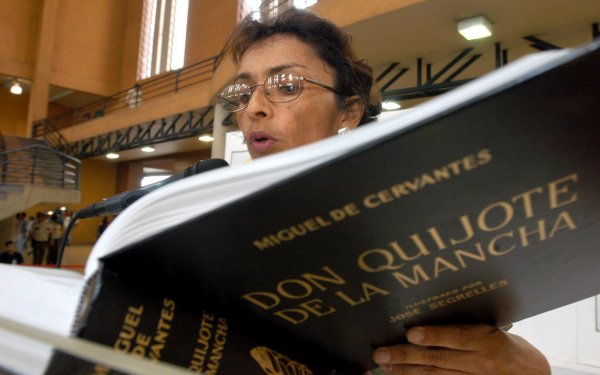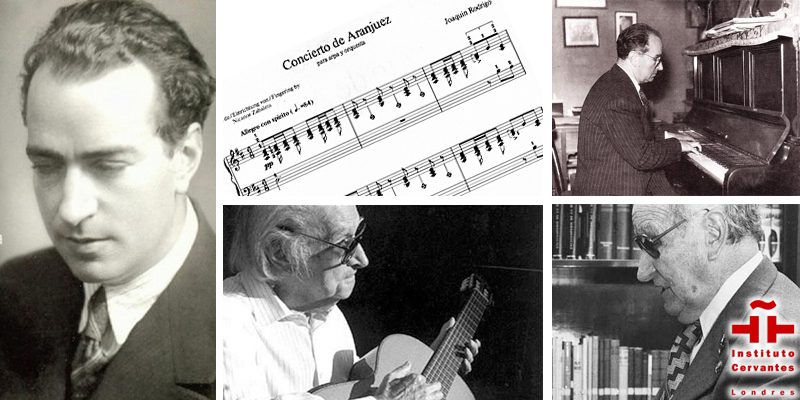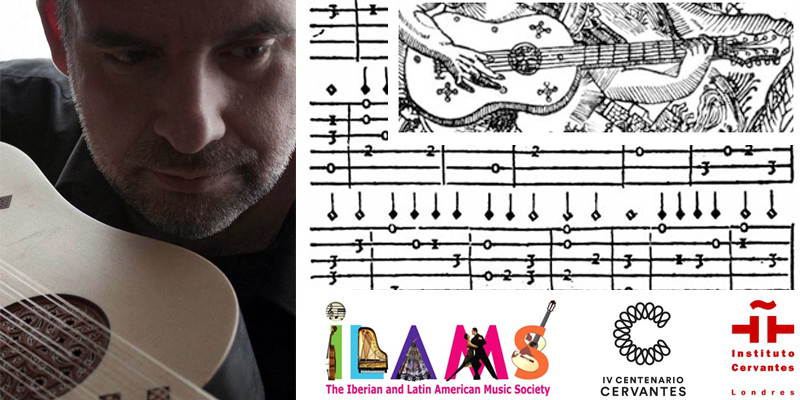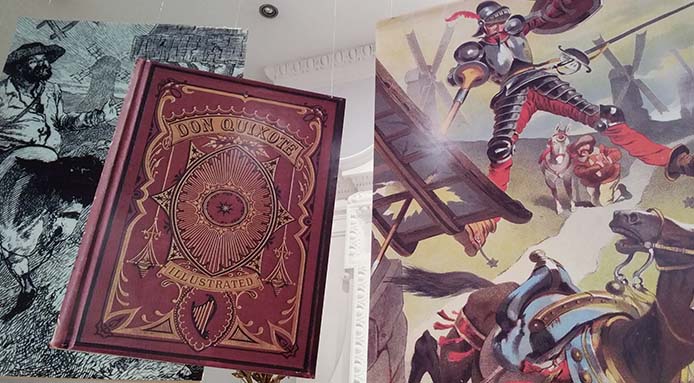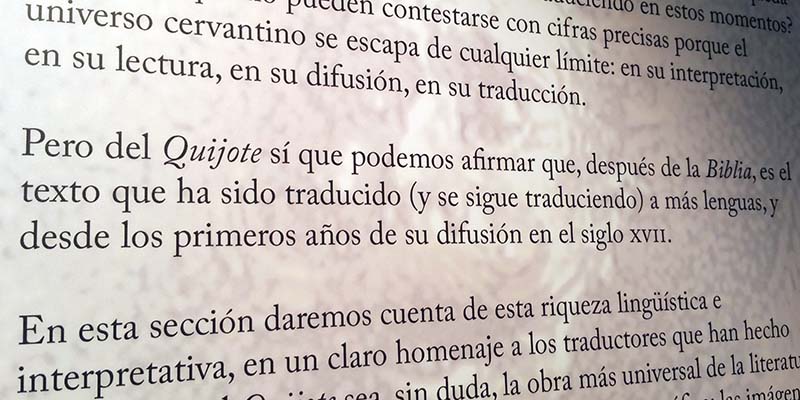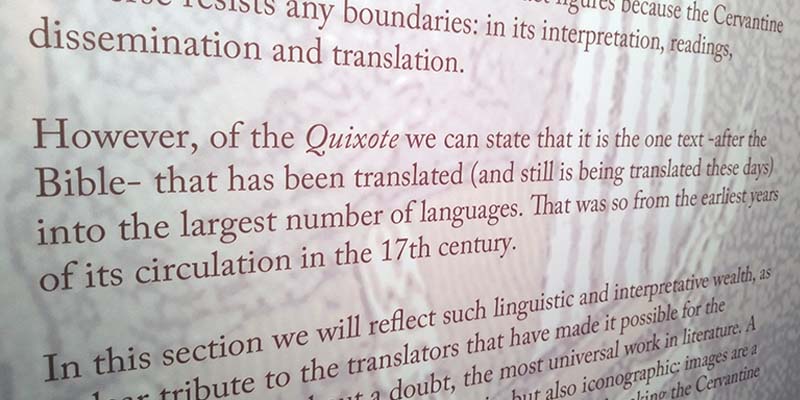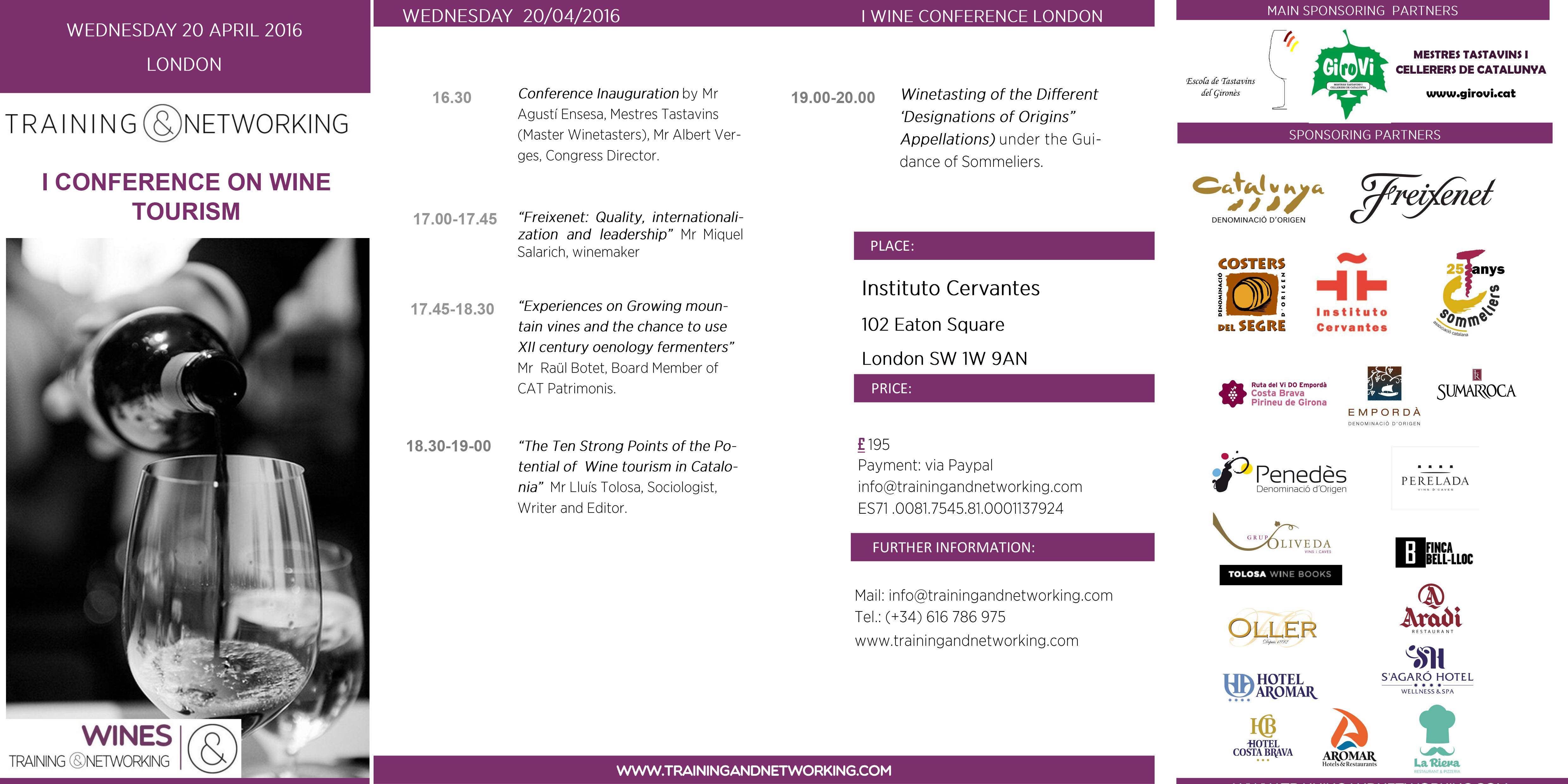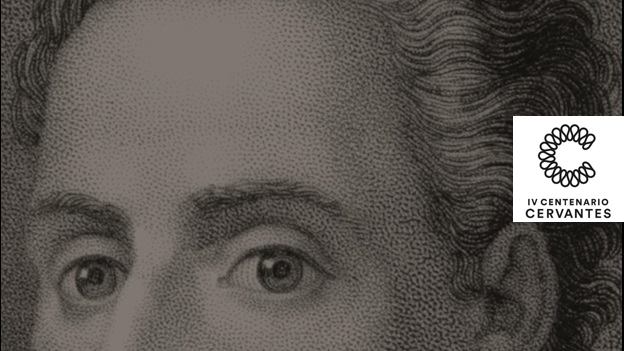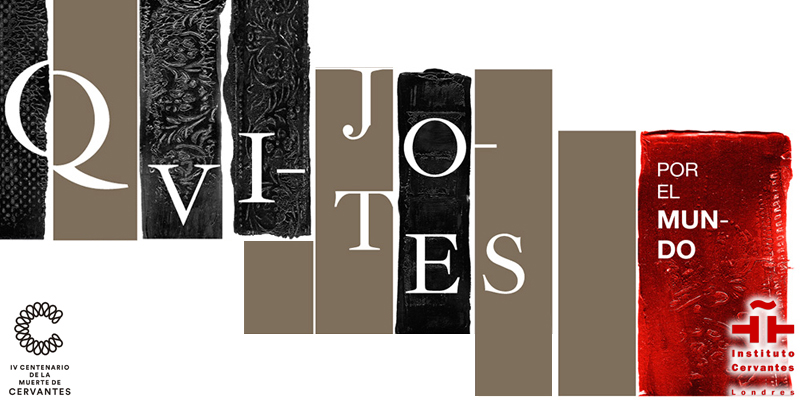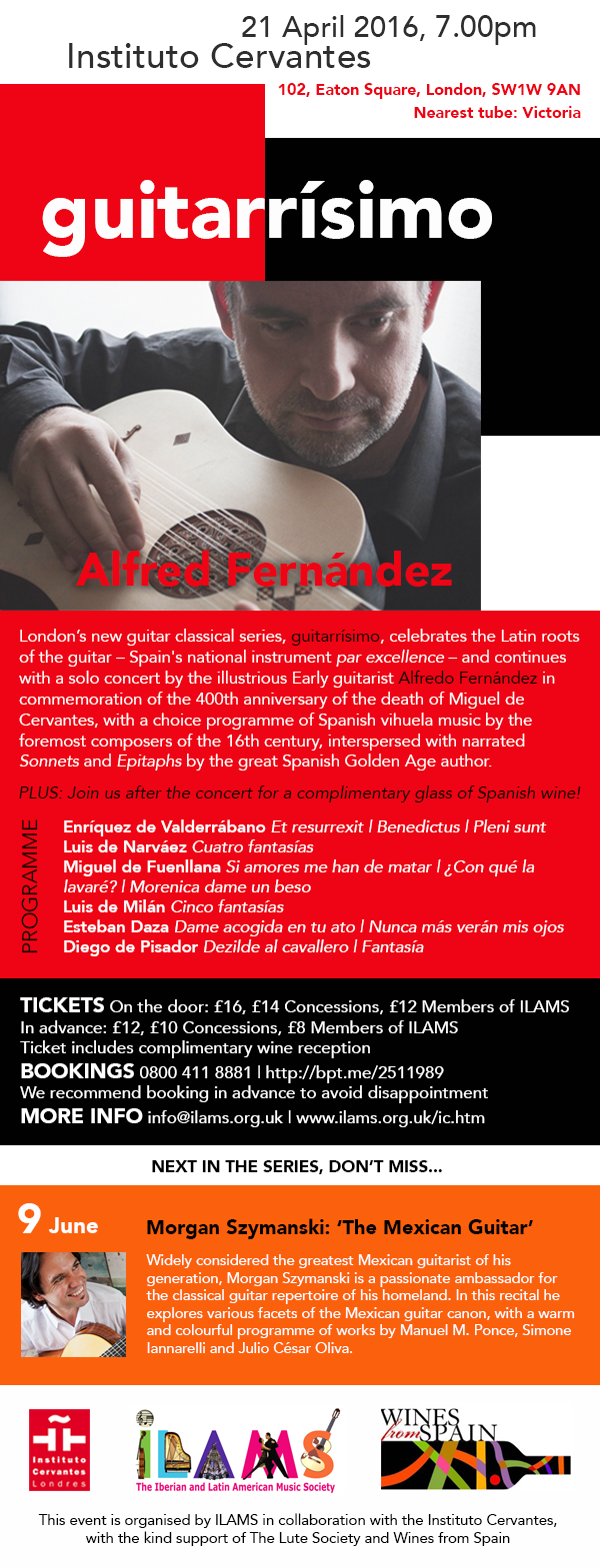Esta semana en el Instituto Cervantes de Londres / The Week At The Instituto Cervantes London
LUNES 25 DE ABRIL 2016
Comienza nuestro curso crash de español, de lunes a viernes 10-13h y 14-17h.
MARTES 26 DE ABRIL 2016
Una charla para entender mejor el pasado de España – Manuel Calzada: «Entre la Inquisición y el aplauso. Los Entremeses de Cervantes y la censura en la Edad de Oro española»

MIÉRCOLES 27 DE ABRIL 2016
En Central Picturehouse, en el marco del ciclo Nuevo Documental Europeo, se proyecta el documental «Bugarach«, seguido por un turno de preguntas y respuestas con el realizador Salvador Sunyer.
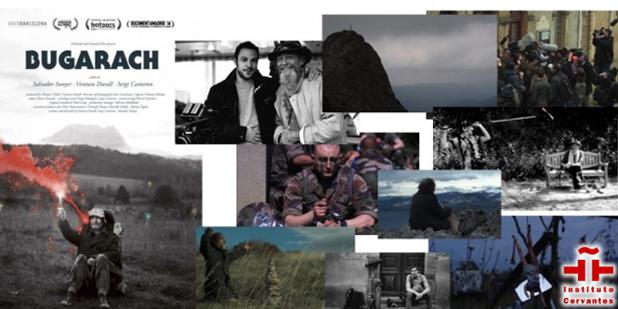
________________________
Siempre puedes consultar toda nuestra oferta trimestral de cursos, tanto para alumnos como para profesores, en nuestro programa académico de primavera, y conocer la cultura del mes en el programa de cultura de abril.
MONDAY 25 APRIL 2016
First day of our Spanish crash course for beginners, Monday to Friday 10am – 1pm and 2pm – 5pm.
TUESDAY 26 APRIL 2016
A talk to delve deeper into the past of Spain – Manuel Calzada: Between Inquisition And Applause. Cervantes’s Entremeses And Censorship In Golden Age Spain
WEDNESDAY 27 APRIL 2016
At Central Picturehouse and part of the New European Documentary series, we recommend the screening of the documentary «Bugarach«, followed by a Q&A session with filmmaker Salvador Sunyer.
________________________
You can always find our complete course offer for students, as well as all teacher training, through late June 2016, in our spring course programme, and see this month’s cultural activity in our April cultural programme.
XX LECTURA CONTINUADA DE EL QUIJOTE – XX CHAIN-READING OF DON QUIXOTE
Este año el Instituto Cervantes de Londres participa mediante videoconferencia en la XX Lectura continuada de El Quijote que organiza el Círculo de Bellas Artes de Madrid.
La Lectura se iniciará a las 18:00 h del viernes 22 y finalizará en torno a las 14:00 h del domingo 24. La inauguración del acto correrá a cargo de Fernando del Paso, Premio Cervantes 2015. Participarán también personalidades relevantes del mundo de la política y la cultura.
La lectura se retransmitirá a través de Radio Círculo en www.radiocirculo.es y de la página web www.circulobellasartes.com – http://www.circulobellasartes.com/humanidades/xx-lectura-continuada-quijote/
En el Instituto Cervantes de Londres, también emitiremos el turno de lectura desde nuestro centro en vivo a través de Periscope. Si quiere vernos, visite nuestro perfil en Twitter el sábado 23 a las 10:15h.
_______________________________________________________________
In only a few days, the Instituto Cervantes London are taking part in the XX chain-reading of Don Quixote, an initiative organised by Madrid’s Circle of Fine Arts via videoconferencing.
The reading will commence at 6pm on Friday 22 April and will go on until approximately 2pm on Sunday 24 April. Fernando del Paso, Premio Cervantes 2015, will open the event, which will see the participation of prominent personalities in culture and politics.
The chain-reading will be broadcast on www.radiocirculo.es and www.circulobellasartes.com, namely http://www.circulobellasartes.com/humanidades/xx-lectura-continuada-quijote/.
At the Instituto Cervantes London, we will also broadcast our part of the chain-reading live on Periscope. If you want to watch us, visit our Twitter account on Saturday at 10:15am.
Esta semana en el Instituto Cervantes de Londres / The Week At The Instituto Cervantes in London
LUNES 18 ABRIL 2016
Comienza el curso intensivo de español para niveles A1 y A2, de dos semanas de duración
__________________
Comienza el curso de español en línea AVE Global de 10 semanas de duración, para niveles de A1 a B1, con apoyo de un tutor
__________________
Comienza el curso en línea para preparadores y examinadores DELE A1 y A2

_____________________________________
MARTES 19 ABRIL 2016
«Joaquín Rodrigo: Voice and Vision» – presentación de libro biográfico sobre el compositor hispano más destacado del sXX, con la presencia de los autores Raymond Calcraft, Elizabeth Matthews y la condesa Cecilia Rodrigo, así como la soprano Catherine Hamilton, el violinista Agustín León, el guitarrista Pepe Romero y el actor Gabriel Woolf.
_____________________________________
JUEVES 21 ABRIL 2016
Guitarrísimo: «Cervantes y su bigüela» – Alfred Fernández interpretará una selección de música del sXVI español en la vihuela
_____________________________________
VIERNES 22 ABRIL 2016
Comienza el curso de gramática para profesores de español, sesiones los viernes
_____________________________________
SÁBADO 23 ABRIL 2016
Comienza el curso de gramática para profesores de español, sesiones los sábados
_____________________________________________________________________________
_____________________________________________________________________________
MONDAY 18 APRIL 2016
First day of the 2-week long Intensive Spanish course for beginners (levels A1 and A2)
__________________
First day of the 10-week long AVE Global online Spanish course with tutor support, for levels A1 to B1
__________________
First day of the online course for DELE A1 and A2 tutors and examiners

_____________________________________
TUESDAY 19 APRIL 2016
Launch of Joaquín Rodrigo: Voice And Vision – the book that looks at the life of the most prominent Hispanic composer of the twentieth century. We will be joined by its authors Raymond Calcraft, Elizabeth Matthews and Countess Cecilia Rodrigo, as well as soprano Catherine Hamilton, violinist Agustín León, guitarist Pepe Romero and actor Gabriel Woolf.
_____________________________________
THURSDAY 21 APRIL 2016
Guitarrisimo: «Cervantes and his bigüela» – Alfred Fernandez will perform a selection of 16th-century Spanish vihuela music.
_____________________________________
FRIDAY 22 APRIL 2016
First day of the grammar course for Spanish teachers, sessions on Fridays
_____________________________________
SATURDAY 23 APRIL 2016
First day of the grammar course for Spanish teachers, sessions on Saturdays
Conferencia inaugural de «Quijotes por el mundo» / Don Quixotes Around The World Opening Lecture
El ministro de España en el Reino Unido, Federico Trillo, la directora de Cultura del Instituto Cervantes, Beatriz Hernanz, el comisionado de la exposición «Quijotes por el mundo», el cervantista y catedrático José Manuel Lucía Megías, y el más conocido traductor contemporáneo del Quijote de Cervantes al inglés, John Rutherford, han inaugurado la exposición «Quijotes por el mundo» compartiendo su experiencia personal con el mundo de Don Quijote de la Mancha y analizando la aportación de Cervantes a la literatura mundial a través de su obra maestra.
«Quijotes por el mundo» es un tributo a Miguel de Cervantes en el IV centenario de su muerte y un reconocimiento a todos los traductores que han contribuido a que, con 172 variantes dialectales de 147 lenguas distintas, «El ingenioso hidalgo don Quijote de la Mancha» sea la obra más traducida del mundo después de la Biblia.
_________________________________________________________________
_________________________________________________________________
Spanish Ambassador in the United Kingdom Federico Trillo, the Head of Culture of the Instituto Cervantes Beatriz Hernanz, the comissioner of the Don Quixote Around The World exhibition Jose Manuel Lucia Megias, and the most well-known contemporary translator of Don Quixote into English Prof. John Rutherford, opened the Don Quixotes Around The World exhibition to the public by sharing their personal experiences with Don Quixote and commenting on Cervantes’s contribution to worldwide literature through it.
Quixotes Around The World is a tribute to Miguel de Cervantes on the IV centenary of his death and a global recognition of all the translators who, having translated Cervantes’s masterpiece into 147 different languages and 172 dialectal variations thereof, have contributed to turning The Ingenious Gentleman Don Quixote Of La Mancha into the second most translated book in the world after the Bible.
«Quijotes por el mundo», el alcance del Quijote de Cervantes / Don Quixotes Around The World, The Scope Of Cervantes’s Masterpiece
En el marco del IV centenario de la muerte del autor hispano más universal, Miguel de Cervantes, en el Instituto Cervantes de Londres hemos inaugurado «Quijotes por el mundo» (exposición comisionada por el catedrático y cervantista José Manuel Lucía Megías), un reconocimiento del alcance de la obra de Cervantes y, a su vez, un tributo a los muchísimos traductores que, desde el sXVII y hasta la actualidad, han invertido su tiempo en hacerla crecer hasta convertirla en un fenómeno cultural global. Mientras estás leyendo estas líneas, alguien en alguna parte del mundo está traduciendo un fragmento de la obra más conocida de Cervantes.
Tras años de investigación y recopilación documental, se ha podido constatar que «El ingenioso hidalgo Don Quijote de la Mancha» de Miguel de Cervantes existe en 172 variedades lingüísticas de 147 lenguas: esta cifra la convierte oficialmente en la obra más traducida del mundo después de la Biblia.
Durante la investigación, se ha observado también que cada traducción e ilustración a lo largo de la historia ha adaptado el personaje del Quijote, su vocabulario, aspecto e indumentaria, al contexto histórico y social del entorno en que se hablaba dicha lengua, hasta hacer universales los valores y lecciones impartidas -y aprendidas- por el particular caballero. En 1863, fue Gustave Doré quien unificara la imagen y figura de Don Quijote, ilustrando y dando así vida al flaco hidalgo y su rechoncho escudero Sancho Panza que conocemos en la actualidad.
Niños, jóvenes y adultos de todo el mundo, durante 400 años, han transcrito, traducido, ilustrado e interpretado en pantalla al Quijote. Ven a ver una muestra de algunas de esas interpretaciones, leer el Quijote en braille y escuchar lecturas de fragmentos de «El ingenioso hidalgo Don Quijote de la Mancha» en otros idiomas: la entrada es libre y la exposición estará abierta en nuestro auditorio hasta el 10 de junio 2016.
Así es «Quijotes por el mundo»:
_____________________________________________________________________________
_____________________________________________________________________________
_____________________________________________________________________________
To mark the IV centenary of the passing of the most universal Hispanic author, Miguel de Cervantes, at the Instituto Cervantes in London we launched the exhibition Don Quixotes Around The World (commissioned by prof. Jose Manuel Lucia Megias, lecturer and Cervantes specialist), with the aim of illustrating the span of Miguel de Cervantes’s most renowned work and paying homage to all those translators involved in its growth over time. As you read these lines, someone, somewhere in the world is working on a translation of an excerpt of Cervantes’s stellar piece of writing.
After a lengthy focus on the compilation of worldwide takes on this book, it has been ascertained that The Ingenious Gentleman Don Quixote Of La Mancha by Miguel de Cervantes has been translated to 172 dialectal varieties of 147 different languages, thus officially becoming the second most translated book in the world after the Bible.
Research also showed that past translations and illustrations of Don Quixote had adapted its main characters’ clothes, vocabulary and overall looks to the historical and social context of the region where the target language was spoken at the time. The hundreds of translators and illustrators of Cervantes’s work throughout history have helped make Don Quixote’s values and lessons universal. It was Gustave Doré who unified the aspect of the book’s characters in 1863, thus creating the slim gentleman Don Quixote and his chubby squire Sancho Panza, nowadays adopted worldwide.
For 400 years, children, teenagers and adults the world over have transcribed, translated, drawn and played Don Quixote on screen. Come watch samples of some of those interpretations, read don Quixote in braille and hear excerpts of The Ingenious Gentleman Don Quixote Of La Mancha read in other languages: admission is free and the exhibition is open at our centre until 10 June 2016.
Here is what you will find at Don Quixotes Around The World (introduction in Spanish):
I Conferencia sobre el Turismo Enológico / I Conference On Wine Tourism
El próximo miércoles 20 de abril, acércate a nuestro auditorio si quieres conocer y hacer contacto con algunos de los perfiles más influyentes de la industria vitivinícola española, en la I Conferencia sobre el Turismo Enológico, el próximo miércoles 20 de abril 2016. Aquí está el programa completo de la jornada, que tendrá lugar en inglés: http://www.trainingandnetworking.com/wp-content/uploads/2016/04/I-CONFERENCE-WINE-TOURISM-LONDON-20-APRIL-2016.pdf
Las plazas son limitadas, por lo que te animamos a reservar tu plaza cuanto antes. El precio oficial para asistir a esta conferencia es de GBP 195, pero nuestros alumnos actuales y antiguos, así como los miembros de nuestra biblioteca, pueden sacar su pase ¡por solo GBP 30! Toda la información sobre el evento y la organización del mismo se encuentra en el siguiente enlace: www.trainingandnetworking.com
¡Esperamos verte en la I Conferencia Turismo Enológico el próximo miércoles 20!
_____________________________________________________________
This coming Wednesday 20 April 2016, come by our auditorium if you are interested in meeting and making contact with some of the most influential people in the Spanish wine industry; we are hosting the I Conference on Wine Tourism. Here is the full event schedule: http://www.trainingandnetworking.com/wp-content/uploads/2016/04/I-CONFERENCE-WINE-TOURISM-LONDON-20-APRIL-2016.pdf. Talks will be held in English.
Places are limited, hence we encourage those interested to be quick to book their seats. Official tariff is GBP 195, however our students (current and former), as well as members of our library, have the opportunity to attend for only GBP 30! Details about the event and the organisers thereof is available here: www.trainingandnetworking.com
We hope to see you at the I Conference Wine Tourism on Wednesday 20th!
Esta semana en el Instituto Cervantes de Londres / The Week At Instituto Cervantes London
LUNES 11 DE ABRIL 2016
Hoy y el resto de esta semana empiezan varios horarios de nuestro curso de español general, niveles A1-A2-B1-B2-C1. Horarios y precios disponibles en nuestro programa académico de primavera, con información complementaria en nuestra página web de cursos.
______________________________
MARTES 12 DE ABRIL 2016
Empieza el curso semiintensivo de español para niveles iniciales
_________________
Empieza el curso de conversación general nivel B2, sesión los martes
Empieza el curso de conversación en contexto: Latinoamérica. Niveles B2 y C1
Empieza el curso de conversación en contexto: historia de España. Niveles B2 y C1
«Lunáticos, amantes y poetas: historias sobre Cervantes y Shakespeare», en la British Library, en conmemoración del IV centenario de la muerte de Miguel de Cervantes y William Shakespeare
______________________________
MIÉRCOLES 13 DE ABRIL 2016
Empieza el curso de conversación general nivel B1, sesión los miércoles
Empieza el curso de conversación en contexto: historia de España. Niveles B2 y C1, sesión los miércoles
Inauguración oficial de la exposición «Quijotes por el mundo», en conmemoración del IV centenario de la muerte de Miguel de Cervantes
______________________________
JUEVES 14 DE ABRIL 2016
Empieza el curso de conversación general nivel B2, sesión los jueves
Empieza el curso de pronunciación en español, niveles A2 y B1
Empieza el curso de conversación en contexto: historia de España. Niveles B2 y C1, sesión los jueves
 ______________________________
______________________________
VIERNES 15 DE ABRIL 2016
Concierto con acento español y Elena Riu al piano en Greenwich.
Conversation Club: «¿Héroes o rebeldes?» – de 17:45h a 19:00h en la biblioteca Reina Sofía en nuestro centro
________________________________________________________________
________________________________________________________________
MONDAY 11 APRIL 2016
Today and the rest of the week start several alternatives to take our flagship general Spanish course, levels A1-A2-B1-B2-C1. Timetables and prices are available in our spring course calendar, with additional information on display on our course website.
______________________________
TUESDAY 12 APRIL 2016
First day of our semi-intensive Spanish course for beginners
_________________
First day of our general Spanish conversation course – level B2, class on Tuesdays
First day of our Spanish conversation course in context: Latin America. Levels B2 and C1
First day of our Spanish conversation course in context: Spanish History. Levels B2 y C1, class on Tuesdays
«Lunatics, lovers and poets: stories about Cervantes and Shakespeare», at the British Library in commemoration of the IV centenary of Miguel de Cervantes’s and William Shakespeare’s death
______________________________
WEDNESDAY 13 APRIL 2016
First day of our general Spanish conversation course – level B1, class on Wednesdays
First day of our Spanish conversation course in context: Spanish Literature. Levels B2 and C1, class on Wednesdays
Official opening of our exhibition Quixotes Around The World in commemoration of the IV centenary of Miguel de Cervantes’s death
______________________________
THURSDAY 14 APRIL 2016
First day of our general Spanish conversation course – level B2, class on Thursdays
First day of our Spanish pronunciation course, levels A2 and B1
First day of our Spanish conversation course in context: Spanish Literature. Levels B2 and C1, class on Thursdays
 ______________________________
______________________________
FRIDAY 15 APRIL 2016
A concert with a touch of Spain featuring Elena Riu in Greenwich
Conversation Club: Heroes or rebels? – 5:45pm to 7:00pm at the Queen Sofia Library at our centre
EXPOSICIÓN: QUIJOTES POR EL MUNDO / EXHIBITION: DON QUIXOTES AROUND THE WORLD
Del 14 de abril al 10 de junio de 2016 – L-V: 10.00h – 18.00h – S: 10.00h – 16.00h
Inauguración: 13/04/2016 – 18:30h
Reservas: bit.ly/quijotes_iclondon
Con la intervención del comisario de la muestra Prof. Manuel Lucía Megías (Madrid) y el Prof. John Rutherford (Oxford), hispanista y traductor del Quijote.
Quijotes por el mundo muestra a un tiempo la riqueza bibliográfica de la red de bibliotecas del Instituto Cervantes y rinde homenaje a cientos de traductores de la obra cervantina que, a lo largo de 400 años, han hecho posible que Cervantes y sus textos se hayan difundido por todo el planeta. El Quijote es, como se suele repetir, la obra más traducida después de la Biblia.
¿Por qué lenguas y culturas tan diversas se han acercado a la obra cervantina, a las aventuras escritas por Cervantes a principios del siglo XVII y protagonizadas por don Quijote y Sancho Panza? ¿En qué momento y por qué circunstancias se impulsó la traducción del Quijote en una determinada lengua? ¿Cuál fue el texto y la lengua de origen de muchas de las traducciones? A estas y otras tantas preguntas se da respuesta en la exposición, que se completa con traducciones iconográficas, cinematográficas, adaptaciones infantiles y juveniles, sin olvidarnos de la voz de lectores de la obra cervantina en 30 lenguas diferentes. Quijotes por el mundo muestra la pervivencia del Quijote, cuatrocientos años después de la muerte de Miguel de Cervantes. Pervivencia de las aventuras narradas y de los valores «quijotescos» en ellas contenidas, que se han traducido y se siguen traduciendo en la actualidad. ¿Qué nueva traducción se estará completando, ahora, mientras se muestra esta exposición? El tiempo nos lo dirá. Ahora es el momento de disfrutar y de asombrarse de tanta riqueza, de tanta variedad lingüística como la que ha suscitado el Quijote en sus cuatrocientos años de andanzas y éxito.
Esta muestra ha sido comisariada por José Manuel Lucía Megías y sus fondos proceden exclusivamente de toda la red de las 60 bibliotecas del Instituto Cervantes.
Actividad celebrada con motivo del IV Centenario de la muerte de Cervantes: http://400cervantes.es
_________________________________________________________________
14 April through 10 June 2016 – Mon to Fri: from 10.00am to 6.00pm – Sat: from 10.00am to 4.00pm
Opening: 13/04/2016 – 6.30pm
RSVP: bit.ly/quijotes_iclondon
With the participation of the curator Prof. Manuel Lucía Megías (Madrid) and Prof. John Rutherford (Oxford), hispanist and translator of Don Quixote.
Instituto Cervantes – Sala de exposiciones, 102 Eaton Square, Londres SW1W 9AN
Quijotes por el mundo (Don Quixotes around the world) shows the rich holdings of the Instituto Cervantes’s network of libraries and, at the same time, pays tribute to the hundreds of translators of Cervantes’s work who, over a period of 400 years, have made it possible to disseminate Cervantes and his texts worldwide.
Don Quixote, as is often repeated, is the most widely translated work after the Bible. Why have such diverse languages and cultures embraced Cervantes’s work, the adventures of Don Quixote and Sancho Panza written by Cervantes in the early seventeenth century? At what moment and in what circumstances was impetus given to translating Don Quixote into a particular language? What was the text and language of origin of many of the translations? These and other questions are answered in the exhibition, which also features iconographic and film translations and adaptations for children and young readers, as well as representing the voice of the work’s readers in 30 different languages. Quijotes por el mundo shows that Don Quixote lingers on 400 years after the publication of the second part in Madrid in the autumn of 1615. The adventures it tells of and the ‘Quixotesque’ values they contain continue to be translated to this day. What new translation is being completed now, as this exhibition opens? Only time will tell. Now is the time to enjoy and be amazed at the richness and the linguistic variety of Don Quixote throughout its 400 years of history and success.
RSVP: bit.ly/quijotes_iclondon
Event held on the occasion of the fourth centenary of the death of Cervantes: http://400cervantes.es/en
Guitarrísimo: «Cervantes y su bigüela» con Alfred Fernández / Guitarrisimo: Cervantes And His Biguela With Alfred Fernandez
Concierto el jueves 21 de abril 2016, 19:00h – entradas
Alfred Fernández: vihuela y recitados
Música de los vihuelistas españoles del siglo XVI
Sonetos y epitafios de Miguel de Cervantes
Durante el siglo XVI, la vihuela se convirtió en uno de los instrumentos más representativos de la música culta española. El padre de Miguel de Cervantes era, al parecer, un gran aficionado a la vihuela. Las referencias a este instrumento son numerosas en la obra del genial escritor.
El programa reúne una variada y representativa selección de música para vihuela de del siglo XVI de Luis de Milán, Luis de Narváez, Enríquez de Valderrábano, Diego Pisador, Miguel de Fuenllana y Esteban Daza.
Alfred Fernández (Barcelona, 1970) estudió guitarra con Jordi Codina, Manel González y Fernando
Rodríguez, especializándose luego en instrumentos antiguos de cuerda pulsada: vihuela, guitarra barroca, laúd, etc. De formación autodidacta, ha recibido consejos de prestigiosos maestros como William Waters, Rolf Lislevand, Paul O’dette o John Griffiths. En la actualidad tiene editados tres CDs como solista. Estos trabajos han recibido excelentes críticas en revistas especializadas como Répertoire, Le Monde de la Musique, Gramophone, Goldberg, Scherzo, Ritmo, Lute Society
Magazine, etc. Su último CD como solista ha sido premiado con el 10R de Répertoire aparte de obtener máximas calificaciones en diversas revistas.
“Alfred genera contrastes de un preciosismo cristalino creando un ambiente ensoñador, mágico y maravilloso». Francisco de Paula Sánchez (Revista CD Compact).
¡Les invitamos a acompañar el concierto con una copa de vino español!
El ciclo guitarrísimo es una cooperación entre el Instituto Cervantes, Iberian and Latin America Music Society (ILAMS) y Wines from Spain. El presente concierto cuenta con la colaboración de la Lute Society.
Actividad celebrada con motivo del IV Centenario de la muerte de Cervantes: http://400cervantes.es/
Venta anticipada: £12/£10
En la entrada: £16/£14
Entradas disponibles aquí
______________________
Concert on Thursday 21 April 2016, 7:00pm – tickets
Alfred Fernández, vihuela and narration
Music by 16th-century Spanish vihuela composers with Sonnets and Epitaphs by Miguel de Cervantes
A precursor of the classical guitar, the vihuela rose to prominence in 16th-century Spain to become one of the most popular classical instruments of its day. It also features conspicuously in the work of the great Spanish Golden Age writer, Miguel de Cervantes, whose father is reported to have been an avid fan of the instrument.
In commemoration of the 400th anniversary of the death of Miguel de Cervantes, the eminent vihuelist, Alfredo Fernández, will perform a choice selection of 16th-century Spanish vihuela music by its greatest composers, Luis de Milán, Luis de Narváez, Enríquez de Valderrábano, Diego Pisador, Miguel de Fuenllana, and Esteban Daza, interspersed with selected readings from Cervantes’ Sonnets and Epitaphs.
Alfred Fernández studied guitar with Jordi Codina, Manuel González and Fernando Rodríguez, before undertaking specialist training in early plucked strings, including vihuela, baroque guitar and lute, with pre-eminent mentors such as William Waters, Rolf Lislevand, Paul O’dette and John Griffiths. He has released three solo albums to great critical acclaim from the classical music press, including Le Monde de la Musique, Gramophone, Goldberg, Scherzo, Ritmo and Lute Society Magazine and Répertoire.
‘Fernández produces colours of crystalline beauty, creating a dreamlike, magical and fantastical atmosphere.’ (Francisco de Paula Sánchez, Compact CD Magazine)
Join us after the concert for a complimentary glass of Spanish wine!
The Guitarrísimo series is a collaboration between the Instituto Cervantes and the Iberian and Latin American Music Society, organised with the kind support of The Lute Society and Wines from Spain.
Activity held on the occasion of the fourth centenary of the death of Cervantes: http://400cervantes.es/en/
Advance bookings £12/£10 Concessions
On the door £16/£14 Concessions
